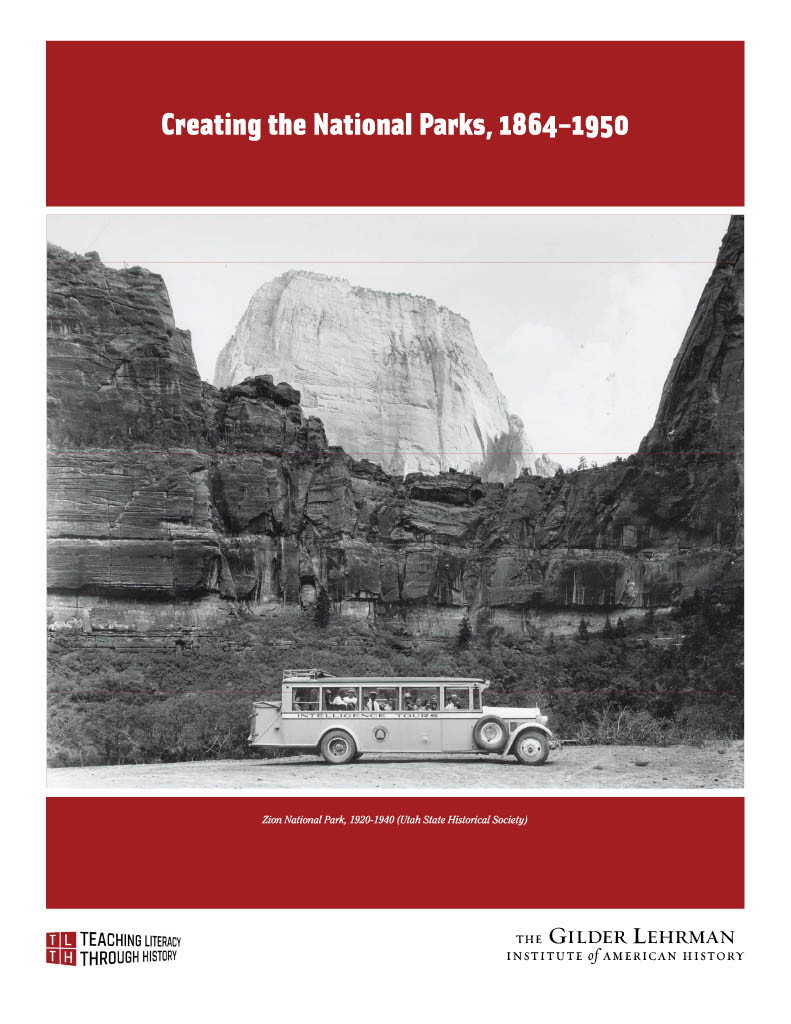Lesson by Melissa Perkins
Essay by Mary Stuckey, Penn State University
Grade Level: 7–12
Number of Class Periods: 5
Primary Theme: Environmental History

The five lessons in this unit explore the development of America’s National Park System from 1864 to 1950. Students will learn about early conservation efforts, the creation of the National Park Service (NPS), recreation in national parks, and the contributions of the Civilian Conservation Corps (CCC) during the Great Depression. They will read an essay by a leading scholar, examine historical photographs, and read excerpts from speeches, magazine articles, and government documents to learn about the evolution of the national parks and America’s commitment to conserving the wilderness.
Lesson Plan Author: Melissa Perkins
Historical Background Essay by: Mary Stuckey, Penn State University
CCSS.ELA-Literacy.RH.6-8.1: Cite specific textual evidence to support analysis of primary and secondary sources.
CCSS.ELA-Literacy.RH.6-8.2: Determine the central ideas or information of a primary or secondary source; provide an accurate summary of the source distinct from prior knowledge or opinions.
CCSS.ELA-Literacy.RH.11-12.2: Determine the central ideas or information of a source; provide an accurate summary that makes clear the relationships among the key details and ideas.
CCSS.ELA-Literacy.SL.11-12.1: Initiate and participate effectively in a range of collaborative discussions (one-on-one, in groups, and teacher-led) with diverse partners on topics, texts, and issues, building on others’ ideas and expressing their own clearly and persuasively.
CCSS.ELA-Literacy.W.11-12.1: Write arguments to support claims in an analysis of substantive topics or texts, using valid reasoning and relevant and sufficient evidence.
How have Americans shown their appreciation for the wilderness?
What endangered the wilderness?
How did Americans protect the wilderness?
Photographs by Carleton E. Watkins, 1861
An Act of June 30, 1864, 38th Congress, 1st Session, Public Law 159, 13 Stat 325, Authorizing a Grant to the State of California of the “Yo-Semite Valley,” and of the Land Embracing the “Mariposa Big Tree Grove”
Photographs by William Henry Jackson, 1871 and 1872
[F. V. Hayden], “The Wonders of the West—II. More About the Yellowstone,” Scribner’s Monthly 3, no. 4 (February 1872)
John Muir, “The American Forests” in Our National Parks (Boston and New York: Houghton Mifflin and Co., 1901)
Theodore Roosevelt, Conservation as a National Duty Speech, May 13, 1908
John Muir, “Address on the Sierra Forest Reservation,” Sierra Club Bulletin 1, no. 7 (January 1896)
General Information Regarding Yellowstone National Park, Season of 1912
Superintendent John R. White, Sequoia National Park, “Atmosphere in the National Parks,” Address to Special Superintendents’ Meeting, Washington, DC, February 10, 1936
Photographs of Capitol Reef National Park-Capitol Gorge, ca. 1940–1950, and Zion National Park-Great White Throne, ca. 1920–1940
Parks and Forests, “General Rules and Regulations,” Federal Register 10, no. 240 (December 8, 1945)
“Park Service Rangers,” by Hugh M. Miller, Superintendent of Southwestern National Monuments, in Region III Quarterly 2, no. 4 (October 1940)
President Franklin D. Roosevelt, “Greeting to the CCC,” July 8, 1933
Photograph of Franklin D. Roosevelt, Gen. Malone, Howe, Ickes, Fechner, Wallace, and Tugwell in the Shenandoah Valley, Virginia
Photograph of “African American enrollees cave crew,” 1935
Photograph of “Creating Hiking Trail,” 1930s, Shenandoah National Park CCC Photo Gallery